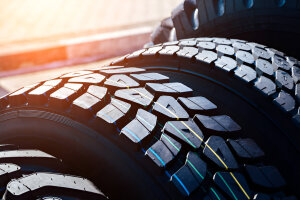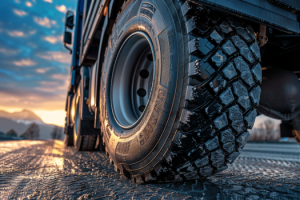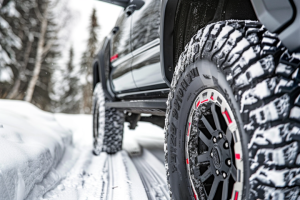Last Updated on September 14, 2025
Top All-Terrain Tires: The Ultimate Truck Tire Guide
Join us as we dive into the world of all-terrain tires with our guide to the Top All-Terrain Tires of 2024. We’ll look at the latest features and advancements that make these tires the best choice for your truck. Whether tackling rough off-road trails or enjoying a smooth highway drive, these tires will take your driving experience to the next level. Let’s explore what makes these tires the top picks of the year! But first… definitions.
What are the Top All-Terrain Tires?
All-terrain tires are made to work well on many different surfaces, such as paved roads, gravel, mud, and light off-road areas. Unlike regular road tires, all-terrain tires perform well on and off the road. Their unique tread pattern is more rugged than standard street tires but less extreme than pure off-road tires. This design usually includes larger tread blocks and deeper grooves, which help improve grip on rough and loose surfaces.
Benefits of All-Terrain Tires for Trucks
The benefits of all-terrain tires for trucks are numerous, making them a popular choice for drivers who seek versatility and reliability:
- Enhanced Traction: All-terrain tires’ aggressive tread design allows for better grip on various surfaces, which is particularly beneficial for trucks navigating challenging terrain.
- Durability: Built to withstand rough conditions, all-terrain tires are often constructed with reinforced sidewalls and more rigid materials, ensuring a longer lifespan even under strenuous use.
- Versatility: Ideal for drivers using their trucks for daily commuting and occasional off-road adventures. These tires provide a comfortable ride on highways while enduring moderate off-road conditions.
- Safety: All-terrain tires’ improved traction and stability enhance overall safety, particularly in varying weather conditions.
Evolution of Top All-Terrain Tires in 2024
The year 2024 has seen significant advancements in the design and technology of all-terrain tires, catering to an increasingly diverse and demanding market. Key developments include:
- Advanced Tread Compounds: Using innovative rubber compounds has improved tire longevity and fuel efficiency without compromising off-road capability.
- Enhanced Tread Designs: Modern all-terrain tires feature more sophisticated tread patterns that offer improved grip and water evacuation, reducing the risk of hydroplaning.
- Focus on Eco-Friendliness: With growing environmental concerns, tire manufacturers are investing in sustainable production methods and materials, aiming to reduce the carbon footprint of tire manufacturing.
- Improved On-Road Comfort: While maintaining off-road proficiency, newer all-terrain tires are engineered to offer a quieter, more comfortable ride on paved roads, addressing one of the traditional compromises of all-terrain tires.
- Technology Integration: Integrating technology such as tire pressure monitoring systems (TPMS) and advanced wear indicators provides drivers with real-time data for better tire management.
Key Features of Top All-Terrain Tires
Reliable all-terrain tires are crucial for truck drivers when navigating different surfaces. So, it is time to explore what makes the best all-terrain tires stand out. We’ll look at their tread design and durability, the materials they’re made of, how well they handle different weather conditions, and the load capacity and size that’s right for trucks.
Tread Design and Durability
The tread design of all-terrain tires is a critical factor influencing their performance. Key aspects include:
- Aggressive Tread Pattern: All-terrain tires typically feature larger tread blocks and broader grooves than standard tires. This design enhances grip and traction on loose surfaces such as gravel and mud while maintaining sufficient performance on paved roads.
- Durability: High-quality all-terrain tires are constructed with durability in mind. They often incorporate reinforced sidewalls and advanced tread compounds that resist wear, cuts, and punctures. This rugged construction ensures longevity even under harsh driving conditions.
- Self-Cleaning Mechanism: Many all-terrain tires have a self-cleaning design that helps eject mud, stones, and other debris from the tread. This feature is crucial for maintaining traction in off-road conditions.
Tire Compound and Weather Adaptability
The composition of the tire plays a significant role in its overall performance, especially in varying weather conditions.
- Advanced Rubber Compounds: Modern all-terrain tires use sophisticated rubber compounds that enhance tread life and provide better grip across temperature ranges. These compounds balance flexibility in cold temperatures with firmness under hot conditions.
- All-Weather Performance: Top all-terrain tires are designed to perform reliably in all weather conditions, including wet, dry, and lightly snowy environments. The tread compound and pattern work together to provide stability and traction regardless of the weather.
- Heat Dissipation: High-quality all-terrain tires are engineered to effectively dissipate heat, a crucial feature for maintaining tire integrity and safety during prolonged high-speed drives on highways.
Load Capacity and Tire Size for Trucks
Choosing the suitable load capacity and tire size is essential for the safety and efficiency of truck operations.
- Load Rating: Each tire is rated for a specific maximum load. For trucks, selecting tires that can safely handle the vehicle’s weight, including cargo, is essential. Overloading tires can lead to premature wear and potential failure.
- Appropriate Sizing: The tire size must match the specifications recommended by the truck manufacturer. Proper sizing ensures the tires provide adequate ground clearance, load distribution, and handling characteristics.
- Variety of Sizes Available: Manufacturers of top all-terrain tires typically offer a wide range of sizes to fit different truck models and configurations. This diversity allows truck owners to find the perfect match for their needs.
Reviewing the Top All-Terrain Tires of 2024: Comparison of Top Models
In 2024, the all-terrain tire market has seen remarkable advancements, with numerous models vying for the top spot. Fortunately, several all-terrain tire models stand out in 2024, each offering unique features and benefits:
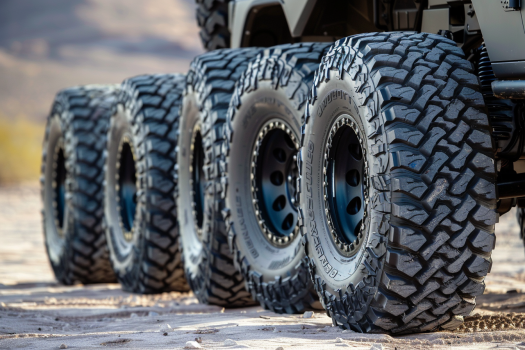
- Model A: Known for its exceptional durability, this tire incorporates advanced tread compounds for an extended lifespan. It is particularly noted for its performance on rocky terrains.
- Model B: This model stands out for its excellent wet and dry traction, thanks to its innovative tread design. It is also praised for its comfortable ride quality on highways.
- Model C: Offering a perfect balance between off-road capability and on-road manners, this tire is favored for its versatility. It features enhanced sidewall protection to withstand rough terrains.
These models represent the pinnacle of all-terrain tire technology, each excelling in specific areas while providing reliable performance.
Performance Analysis in Various Terrains
Analyzing how these tires perform in different terrains is crucial for understanding their versatility:
- On-Road Performance: While designed for versatility, all-terrain tires in 2024 have shown significant improvements in on-road comfort and noise reduction, making them suitable for regular highway use.
- Off-Road Capability: These tires excel in off-road conditions, providing ample traction in mud, gravel, and sand. Their robust construction ensures they can withstand the rigors of off-road use without compromising safety.
- Adaptability to Weather Conditions: A key feature of the 2024 models is their adaptability to various weather conditions. They perform reliably in dry and wet conditions; some models even perform well in light snow.
The Impact of Tire Choice on Truck Performance
The choice of tires is critical for any truck owner, as it directly impacts the vehicle’s performance, safety, and efficiency. Here’s how tire selection affects truck performance, focusing on safety, handling, fuel efficiency, and tire longevity and maintenance.
Safety and Handling Considerations
The right tires play a pivotal role in ensuring the safety and handling of a truck:
- Traction and Grip: Tires with adequate traction are essential for maintaining control, especially in adverse weather conditions. The tread design, rubber compound, and tire pressure determine how well a tire grips the road.
- Handling and Stability: The type of tires used significantly influences a truck’s handling. Tires designed for specific purposes, such as all-terrain or highway tires, can enhance the vehicle’s stability and cornering capabilities.
- Braking Distance: A truck’s ability to come to a safe stop dramatically depends on its tires. Tires with better grip can reduce braking distances, thereby enhancing safety.
Fuel Efficiency and Tire Selection
Tire selection can also have a noticeable impact on a truck’s fuel efficiency:
- Rolling Resistance: Tires with lower rolling resistance require less moving energy, improving fuel efficiency. Many modern tires are designed to minimize rolling resistance without compromising safety or durability.
- Tire Pressure: Maintaining the correct tire pressure is crucial for fuel efficiency. Under-inflated tires increase rolling resistance and, consequently, fuel consumption.
- Weight and Size: Tire weight and size can also affect fuel economy. Heavier and larger tires may lead to increased fuel consumption.
Longevity and Maintenance Tips
The lifespan of tires is an important consideration, impacting the long-term cost and performance:
- Regular Inspections: Regularly checking tires for wear and tear, cracks, or bulges can help identify issues early and prolong tire life.
- Proper Inflation: Keeping tires inflated to the manufacturer’s recommended levels is crucial for maximizing tire life and ensuring safety.
- Rotation and Alignment: Regular tire rotation and wheel alignment can prevent uneven wear and extend the life of the tires.
- Driving Habits: Driving habits significantly influence tire wear. Aggressive driving, such as rapid acceleration and hard braking, can shorten tire lifespan.
Installation and Care of All-Terrain Tires
Proper installation and maintenance of all-terrain tires are crucial for ensuring optimal performance, safety, and longevity. Nonetheless, installing all-terrain tires requires precision and adherence to specific guidelines. Here are some of them:
- Professional Installation: It is highly recommended that professionals install tires. They possess the necessary expertise and equipment to correctly mount and balance the tires.
- Balancing Tires: Proper balancing is crucial to avoid vibrations and uneven wear. Balanced tires ensure a smoother ride and extend tire life.
- Checking Tire Pressure: Ensure the tires are inflated to the manufacturer’s recommended pressure upon installation. Incorrect tire pressure can lead to poor handling and increased wear.
- Alignment Check: A wheel alignment check is advised after installing new tires. Proper alignment prevents irregular tire wear and improves vehicle handling.
Routine Maintenance for Maximum Tire Life
In the same manner, regular maintenance is critical to maximizing the life of all-terrain tires. Here are some things to follow during maintenance.
- Regular Pressure Checks: Check tire pressure monthly, as proper inflation is essential for optimal tire performance and longevity. Under-inflated tires can lead to overheating and increased wear, while over-inflation can make tires more susceptible to damage from road debris.
- Tire Rotation: Regular tire rotation, typically every 5,000 to 8,000 miles, ensures even tire wear. This practice is essential for all-terrain tires, which may experience more irregular wear due to varied driving conditions.
- Inspections for Wear and Damage: Periodically inspect tires for signs of wear or damage, such as cracks, bulges, or embedded objects. Early detection of issues can prevent further deterioration and maintain safety.
- Cleaning Tires: Regular cleaning of tires can remove debris that may deteriorate the rubber over time. Use mild soap and water for cleaning, and avoid harsh chemicals.
When to Replace Your Tires
Knowing when to replace your tires is vital for maintaining safety and performance:
- Tread Depth: The most common method to check for tire replacement is measuring the tread depth. Tires should be replaced when the tread depth reaches 2/32 of an inch.
- Tread Wear Indicators: Modern tires have tread wear indicators and small raised bars within the tire tread grooves. When these bars flush with the tread, it’s time to replace the tires.
- Age of Tires: Regardless of tread depth, it is advisable to replace tires that are over six years old, as the rubber compounds deteriorate over time, potentially leading to reduced performance and increased risk of tire failure.
- Performance Issues: Any noticeable decline in performance, such as reduced traction, poor handling, or increased stopping distances, can indicate the need for new tires.
Cost Analysis: Investing in Quality Tires
Investing in quality tires is essential for any truck owner, as it directly impacts safety, performance, and overall vehicle expenses. But the cost of tires can vary significantly based on several factors such as the following:
- Tire Type and Quality: High-performance all-terrain tires typically cost more than standard tires due to their advanced materials and technology. Durability, brand, and specific tire features also affect the price.
- Size and Specifications: Larger tires or those with unique specifications (like reinforced sidewalls or advanced tread designs) generally cost more due to the additional material and design complexities.
- Brand Reputation and Warranty: Established brands often charge a premium for their tires, but this usually comes with the assurance of quality and extended warranties, which can be a worthwhile investment.
- Seasonal Variations: Tire prices can fluctuate based on the season, with certain types (like winter tires) being more expensive during high-demand periods.
Nonetheless, even if initially expensive, investing in a quality tire still helps you save money in the long run. Here’s how:
- Fuel Efficiency: High-quality tires with optimized rolling resistance can improve fuel efficiency, saving fuel costs over time.
- Reduced Wear and Tear: Durable tires that wear evenly lessen the need for frequent replacements, decreasing long-term costs.
- Safety and Maintenance Costs: Quality tires can enhance safety and reduce the likelihood of accidents, lowering insurance premiums and maintenance costs.
- Resale Value: Trucks fitted with high-quality tires can maintain a higher resale value, indicating well-maintained vehicle condition.
Financing Options at Tires Easy Truck
To make quality tires even more accessible, Tires Easy Truck offers several financing options to bring you long-term benefits and reduce the initial cost impact. Here are the options you can look into:
- Payment Plans: Customers can opt for payment plans that allow them to purchase tires and pay over time, making it easier to manage the upfront cost.
- Seasonal Promotions and Discounts: Periodic promotions and discounts can provide significant savings, especially when purchasing a complete set of tires.
- Credit Options: Tires Easy Truck may offer credit options with competitive interest rates, allowing customers to purchase tires without immediate financial strain.
- Trade-In Deals: Sometimes, customers can trade in their old tires for a discount on new ones, reducing the overall cost.
How to Select Tires for Your Truck
Choosing the right tires for your truck is a crucial decision that impacts the vehicle’s performance, safety, and efficiency. So, it’s time to learn how to assess your driving needs and ensure compatibility with your truck model.
Assessing Your Driving Needs
Understanding your driving needs is the first step in selecting the appropriate tires for your truck. While every driver differs (and so do their needs), a few things remain standard. Here are those things to consider:
- Driving Environment: Consider the typical environments in which you drive. For instance, all-terrain or winter tires might be best if you frequently traverse off-road terrain like mud, gravel, or snow. Alternatively, you may prefer tires designed for smoothness and fuel efficiency, primarily for highway driving.
- Load and Towing Requirements: Evaluate the load you typically carry or tow. Heavier loads require tires with a higher load rating to ensure safety and optimal performance.
- Driving Style: Consider your style—whether you prefer a comfortable, quiet ride or a more performance-oriented experience. Different tire types cater to other driving preferences.
Compatibility with Your Truck Models
Selecting tires compatible with your truck model is essential for safety and performance. It will also avoid the risk of purchasing a tire that doesn’t fit. Here’s how to know what tires fit and what tires don’t:
- Size Specifications: Refer to your truck’s owner manual for tire size recommendations. The correct size ensures the tires fit well and the car operates as intended.
- Tire Type Suitability: Certain trucks are designed with specific tire types in mind. For example, heavy-duty trucks require more robust tires than light-duty trucks.
- Manufacturer Recommendations: Some truck manufacturers may suggest specific tire brands or models optimized for their vehicles. Following these recommendations often leads to better performance.
The Best Way Out Consulting with Tire Experts at Tires Easy Truck
At Tires Easy Truck, experienced professionals can provide insights into the best tire options based on your specific requirements. They can help decipher technical aspects like tire ratings and tread patterns.
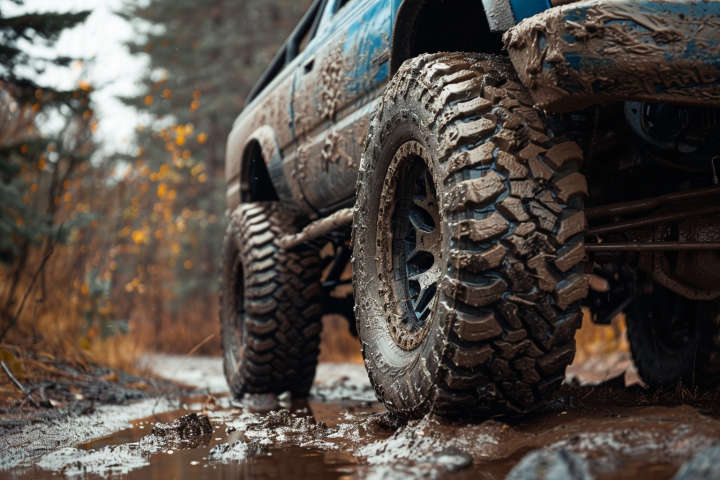
On top of this, experts can offer tailored recommendations, considering factors like local climate, typical road conditions, and your truck’s performance characteristics.
Beyond just purchasing tires, consulting with experts at Tires Easy Truck ensures ongoing support, including installation advice, maintenance tips, and handling any tire-related issues.
How to Purchase at Tires Easy Truck
Purchasing your next set of all-terrain tires is a seamless process at Tires Easy Truck. Our user-friendly website, Tires Easy Truck, offers a wide selection of the latest tire models, catering to various preferences and requirements. You can browse through detailed product descriptions, compare different tire models, and view customer reviews to help you make an informed decision.
Once you have selected the right tires for your truck, the purchase process is straightforward, with secure payment options. Additionally, Tires Easy Truck provides professional installation services, ensuring that your new tires are fitted perfectly for optimal performance and safety.
Conclusion
Choosing the right all-terrain tires is a crucial decision that affects your truck’s safety, efficiency, and performance. We recommend considering your specific driving conditions, truck model, and personal preferences when selecting tires. Ensure that the tires you choose meet your vehicle’s load and speed ratings, and consult with tire experts if you need guidance.
Now is the perfect time to upgrade your truck with the best all-terrain tires of 2024. Visit Tires Easy Truck for a comprehensive range of options and take the first step towards enhanced performance and safety for your truck. With our expert guidance, quality products, and exceptional service, you are just a few clicks away from the perfect tires for your adventures.
Explore and Purchase Your All-Terrain Tires Now
Upgrade your truck today with Tires Easy Truck – where quality meets reliability and performance.
FAQs
Q1: What makes all-terrain tires different from regular tires?
All-terrain tires are designed to balance off-road toughness and on-road comfort. They feature a more aggressive tread pattern than regular tires, offering better traction on surfaces like mud, gravel, and light snow while ensuring a relatively smooth ride on paved roads.
Q2: Are all-terrain tires suitable for all seasons?
While all-terrain tires are versatile, their performance in winter conditions varies. Some all-terrain tires, including light snow, are rated for all-season use but may not perform as well as dedicated winter tires in extreme winter conditions.
Q3: How long do all-terrain tires typically last?
The lifespan of all-terrain tires depends on factors like tire quality, driving habits, and maintenance. On average, well-maintained all-terrain tires can last between 40,000 and 70,000 miles.
Q4: Can all-terrain tires improve fuel efficiency?
Due to their heavier construction and aggressive tread design, all-terrain tires can be less fuel-efficient than regular highway tires. However, some modern all-terrain tires are designed to minimize this impact.
Q5: Are all-terrain tires noisier than regular tires?
Due to their aggressive tread patterns, all-terrain tires can produce more road noise than regular tires, especially at higher speeds. However, many newer models are designed to reduce noise levels.
Q6: Should I opt for regular or all-terrain tires for my truck, considering the need to handle both on- and off-road conditions and heavy loads?
All-terrain tires might be essential for specific vehicles, especially light trucks that navigate a mix of on- and off-road environments while carrying substantial loads. While standard LT (Light Truck) tires can manage the weight, all-terrain tires are superior for achieving optimal performance across diverse surfaces.
Q7: Who benefits most from using all-terrain tires?
Vehicles that frequently transition between uneven terrains and paved roads—such as pickup trucks or SUVs that travel from urban areas to rural settings—will significantly benefit from the versatility of all-terrain tires.
Q8: Do all-terrain tires lead to higher fuel consumption?
Indeed, all-terrain tires can impact fuel economy due to their increased diameter and excellent rolling resistance. For passenger vehicles, this may result in a fuel efficiency reduction of approximately 3-5%, and for trucks, the decrease can range from 5-10%, which translates to a loss of 1-3 miles per gallon.







